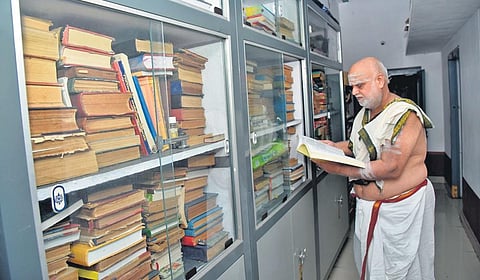

RAJAMAHENDRAVARAM: Last year, after a long gap of half-a-century, the famous Jagadguru Shankaracharya of Sringeri Sharada Peetham found a person eligible to honour with the prestigious ‘Darshana Alankara’ title. It was Viswanatha Gopalakrishna Sastry, an expert in explaining the meaning of Vedas and interpreting them aptly. This Maha Mahopadhyaya was also honoured by President of India Ram Nath Kovind on April 4, 2019.
The life mission of this septuagenarian scholar is to conserve and propagate Vedic knowledge to benefit posterity. Gopalakrishna Sastry now runs Vedic classes, specifically Tarka Vyakaranam and Veda Bhashyam, online from his residence at Tummalava area in Rajamahendravaram.
“Vedas are the guides for righteous life. They provide guidance and direction. Preserving the Vedas is not the duty of one particular caste, Brahmins. It is the duty and responsibility of every varga of the Hindu society. For that matter, Vedic period is the golden age for the entire humanity,” he says. According to Gopalakrishna, anybody who has got upanayanam (sacred thread ceremony) is eligible to learn Vedas.
Gopalakrishna wields excellent command on logic (tarka), grammar (vyakarana) and interpretation (Veda Bashyam). He had served as the principal of SGVP Oriental College. In the last 50 years, he had participated in innumerable yagnas held in various parts of the country. One of the rarest opportunities for a Vedic scholar is to preside over the prestigious Veda Sabha in Varanasi. He got this opportunity in 2019. What more? He is the chief examiner for all the Vedic exams conducted in India.
Born in a learned family of Vedic scholars in 1949, Gopalakrishna studied Vedas and Sanskrit under noted Vedic scholars Lanka Narasimha Sastry, Peri Venkateswara Sastry, Peri Suryanarayana Sastry, Goda Subramanyam Sastry, Rani Narasimha Sastry and Remilla Surya Prakash Sastry for over 12 years. He is a gold medallist in Sanskrit from Andhra University.
Gopalakrishna mooted the idea of incorporating the protection and promotion of Vedas in the Corporate Social Responsibility (CSR). He asked the Narendra Modi government to bring in a law to this effect. He says public sector giants such as ONGC and GAIL should become a part of the initiative to preserve Vedic knowledge. “Protecting the Vedas is more meaningful than sponsoring cricket,” he opines.
He never hesitates to praise the efforts of others for promoting Vedic knowledge. He lauded the efforts of religious institutions such as Kanchi Kamakoti Peetham and Tirumala Tirupati Devasthanams (TTD) for their efforts to promote Vedas and Sanskrit and also support Vedic scholars. Jeeyar Educational Trust has been doing an excellent job by teaching sastras to non-Brahmins.
Former DGP Aravind Rao is doing a marvellous job by teaching sastras online, he says. Stating that recitation is more important in learning Vedas, he said pronunciation is more clear in twin Godavari, Krishna and Guntur districts. This region is currently home to about 400 Vedic scholars.
Uniqueness of Guru-Sishya bond
Several prominent personalities after their retirement became his sishyas in their endeavour to explore the essence of Vedas. A woman from Tamil Nadu came all the way to Rajamahendravaram to exclusively learn Tarka Sastra. A retired IFS officer P Ravikumar has also studied Vedas under Gopalakrishna. A few techies from reputed IT firms also studied Vedas under him.
‘Vedas are our true wealth’
“The wealth of our country truly lies in our Vedic knowledge and not elsewhere. No matter how far India progresses in the achievement of material wealth, the one field it has no competitors is Vedas and Vedic culture. The spiritual culture is the best and finest of Indian wealth,” he says, insisting that the government should treat it as its primary duty to preserve the Vedas.